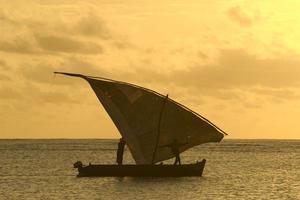Advertisement
Published: August 22nd 2006

 Dhow at sunrise
Dhow at sunrise
Fishermen from Uroa going fishing early in the morning.The view from our bungalow is simply beautiful. Palm trees, the Indian Ocean and the sky. It is so quiet here. The only sound you hear is the sound of the waves breaking on the shore. Oh, yes. I almost forgot: There is a mosque nearby and by 5.30 the imam calls for prayer. A little later the cocks start crowing. But those sounds underline the silence of this place. This is the perfect place to relax. There is absolutely nothing to do here except take it easy. Oh, yes. There are quite a number of fishermen going out between 6 and 7 every morning. The sun rises at 06.25 and I try to be there to get some nice pictures. The light is changing quickly at that time, so it is very interesting for photography. One day I helped a group of fishermen push their boat across the beach to the sea. They thought that was a very unusual thing to do. The traditional boats (dhows) are made of hollow logs of papaya and have one wing on either side resembling a katamaran. Several of them use an outboard engine in addition to the sail.
Early in the morning there are dozens of ladies wading in the water harvesting seaweed. They farm this here. The seaweed is dried on the stands and then sold to a Japanese company at Tsh 100 a kilo. It is hard work to gather the weed and very poorly paid.
Asbjørn Tennfjord is the most famous Norwegian in Uroa. He is credited with bringing electricity to the village. Bringing electricity to the village was part of a large project funded by the Norwegian Government through NORAD. We learned this during a walk through the village. There is about one kilometre to the centre of the village. We have discovered three or four small shops. Neither of them had anything to offer that really interested us. They were of the type where you stand on the outside and look at the goods inside. For 300 Tsh we bought two packets of biscuits from the shop on the main road. The owner called himself Gianluca, but he also had a Swahili name.
Zanzibar Safari Club is a five star resort a few hundred metres south of us. The Safari Club is a resort in a totally different price range than the place where we stay. They have a nice pool and immaculately kept gardens. At the reception we met two very friendly girls who assured us we were welcome to have both lunch and dinner with them. Dinner is a buffet and is priced at USD 25.
We chose something less pricy and had two nice vegetarian dishes costing Tsh 21.000 (ca NOK 100).
It is always nice talking to Trond Furseth, the Norwegian owner of Tamarind, when he comes from Stone Town. It is nice talking to a fellow countryman when you are far from home. Trond has lived here for over 15 years and had lots of interesting information to share about life on Zanzibar. He built Tamarind Beach Hotel in 1990.
The staff here at Tamarind Beach Hotel is so nice. Haji, one of the waiters does his level best to teach us appropriate phrases in Swahili. I don’t think we are very good students.
One morning as we were having breakfast in the restaurant we heard a thud and I saw a coconut bouncing on the ground. I picked it up and Haji opened it for us. What a revelation. We have only seen coconuts as they are sold in Norway: Brown, hard and hairy. But the oval shaped fruit that fell from the tree looked nothing like that. But Haji’s work with the knife revealed the inner nut. Then he took the nut in his hand and hit it hard around the middle with the huge knife. In a matter of seconds it broke open. The flesh inside was so fresh and nice.
Advertisement
Tot: 0.058s; Tpl: 0.01s; cc: 5; qc: 44; dbt: 0.0366s; 1; m:domysql w:travelblog (10.17.0.13); sld: 1;
; mem: 1.1mb

 Dhow at sunrise
Dhow at sunrise